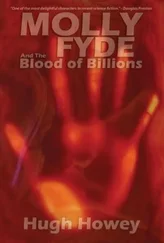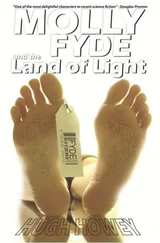Then she woke up.
Faith looked down and realized she was stretched across her bed. Maxwell must have carried her into the bedroom. She called to him. No answer. She could have been angry again, but she fought that urge, wondering with absolute uncertainty if she was indeed Faith Cross who dreamed she was a maple tree, or a maple tree yet dreaming she was Faith. Somehow, not knowing made her peaceful again. She reviewed the last year with Maxwell, and decided it was neither real nor a dream, but a nightmare somewhere between life and death. She remembered the wedding ceremony at Mount Calvary Baptist Church on the South Side, and the grinning guests from Maxwell’s office. Even Mrs. Octavia Beasley had come, dressed in white with an enormous pink peony pinned to her dress, crying as though Faith were her only child. Barrett, she remembered, had been absent, conspicuously so. He never plagued her again. It was just as well. He would have disapproved of the many tables of catered food in the church basement, her gown of ivory silk organza and imported lace. Maxwell, believing her story of being orphaned early in life, had agreed to pay all the wedding expenses. He had even seemed happy their first few weeks together, felt on top of things, and decided to rent an apartment for them by the lakefront. In the sky. He’d spent money freely, anticipating his hundred-dollar raise. Vividly she remembered the horror in his eyes the evening he came home a month after their wedding to announce that the prison column had been postponed until the newspaper’s circulation picked up. All the Chicago papers were failing, he said, and The Sentry was failing fastest.
“It’s television!” he fumed at the dinner table. “People think they can get their news off the television sets.” He scowled and exhaled heavily, hurtling food from his teeth across the table at her. Looking around the room at the cause of their debts — a six-hundred-dollar stereo, expensive furniture, and Wedgwood-pattern wall-to-wall carpeting — enraged him. It brought on an attack; he grabbed at his chest and frantically pumped his respirator. “You’ve got to stop buying so much. Goddamn it, Faith! We’ll go bankrupt!”
Then the fights began. They were all one-sided. “I don’t argue,” Maxwell said, which meant he turned his back to her and dammed his ears after laying down a law. In turn, Faith hurled furniture at his back, tore the gossamer-thin silk curtains from the wall, and started to break, one by one, their china. If all else failed, she could scream to shatter his silence. “If you don’t care about me, ” he’d roar, “then think about the neighbors!” She would scream louder, and Maxwell, in frustration, would shake her until her teeth rattled. “Then think about the landlord !”
It was a nightmare. Faith climbed out of bed and went into their electrical U-shaped kitchen. Wainscoted wall cabinets formed a continuous line around the corners of the room, and here and there were electrical appliances which, she realized, saved her time but failed to tell her what to do with those extra hours. She pulled back the curtain of the room’s single window and looked down the sixteen stories to the street. Pedestrians were below — as tiny as chinches on a pillowcase. And wasn’t that view what she’d wanted, searched and lied for? Wasn’t Maxwell, after all, the good thing Lavidia told her to find? The words turned sour on her tongue. She bent over the sink, feeling old, knowing that accusing him would be easy. Also, wrong. Maxwell wasn’t evil, just disillusioned, not malicious, only disappointed. She knew she’d destroyed something important in him when she confessed her past in a moment of depression last Christmas. It had been a mistake. A sense of melancholy had enveloped her like a sheath, a nagging sense of dread that had no location, and she’d turned to him, spilling her memories of the hotel. The realization shook him horribly; he moved his pillow and bed clothing into the living room to sleep as far away from her as possible after that night. On the sofa. He slept there still, sulking, uncomfortably pinched between the armrests. She tried not to think about it. It wasn’t her fault that no one had told him what life was about — the degradation, the death of great dreams.
Now she felt queer again, a muscle beating in her forehead, her hands burning on her wrists. Faith began to busy herself in the kitchen: she dropped two slices of diet bread into the toaster and removed a carton of eggs from the refrigerator. One she set on the counter to boil for her breakfast, then, remembering her daily struggle with IT, she took two, broke them in a saucer and separated the white of the eggs from the yolks. She took the saucer into the bathroom and smeared the white of the eggs on her face, staring at herself in the mirror until her skin began to tighten and draw up. Her thoughts slipped back and forth between memories, and though she faced the mirror she did not see herself for a while, not until the egg facial hardened and the surface of her skin appeared to crack, the lips turning white, the lines in her face becoming deep like those in clay baked by the sun. The facial made her look old and ossified, as brittle in her bones as Lavidia had been. She squinted, knowing she wasn’t old, knowing her life was not already at an end, but unable to convince her uneasy stomach of this.
Came smoke from the kitchen. She hurried there, her face drawn up tight, and found the toast burning — it hadn’t popped up and the room was full of the sharp smell of smoke. Now she wasn’t hungry. Faith dumped the toast into a cellophane-lined waste can and stumbled into the living room, feeling raw; she left the curtains drawn and sat down in the middle of the floor, crying until the tears ran down her cheeks and washed off a good deal of her facial. Something had gone wrong a long time ago. It seemed that she wasn’t out of bondage, not one bit. But that made no sense. What had been days of destitution and a destiny-driven life on the streets were now days of leisure. What had been a life of need was now a life of relative ease. Her closets were filled with custom-made clothing. She had more than ample food, a purse bulging with special plastic cards to purchase, on the spot, anything that caught her eye. She had everything, children, all the good things.
But Faith jumped to her feet, floundering around the spacious living room, afraid and pulling at her fingers. She wandered from room to room and finally stopped when she passed the bathroom again. For an hour she soaked herself in the tub, still feeling somehow unclean and uncomfortable at the pit of her stomach, thinking: whenever she tried to pin this feeling down to a specific thing, such as something Maxwell had said or done, or anything that irritated her regularly, it escaped, slipping away as buoyant as the soap in her tub when it was pushed under water. As she toweled herself dry Faith knew she had experienced nothing like this until she came North. Yet it had nothing to do with locality. She and Maxwell had traveled through the Carolinas and had stopped for a few days in Georgia during their honeymoon. Even then she had felt it. Just to make sure the malaise was within her and not in the world, she coaxed Maxwell into driving through Hatten County. At first sight of the hills, the familiar scenery, she’d grown excited. She directed him to her parents’ old farmhouse, pretending to be in search of a good fortune-teller in the backwoods who could foresee their future. The farmhouse was burned to the ground. Dark as satyr droppings. The stones that once supported it were strewn around the yard; only two walls, those on the sides, and the black stove of the kitchen kiln still stood, like lonely rocks at Stonehenge. Nothing remained of the furniture inside. All was ash. And around her parents’ graves thick weeds had grown. In town she learned from a feed-store merchant new to the county that lightning had exploded along the farmhouse roof months ago and, within hours, the building was gone. It was so far off the road that the firemen had been unable to come within a hundred yards with their trucks and hoses. So blackened wood, skeletal foundations, and the stench of sulfur were all that remained.
Читать дальше












